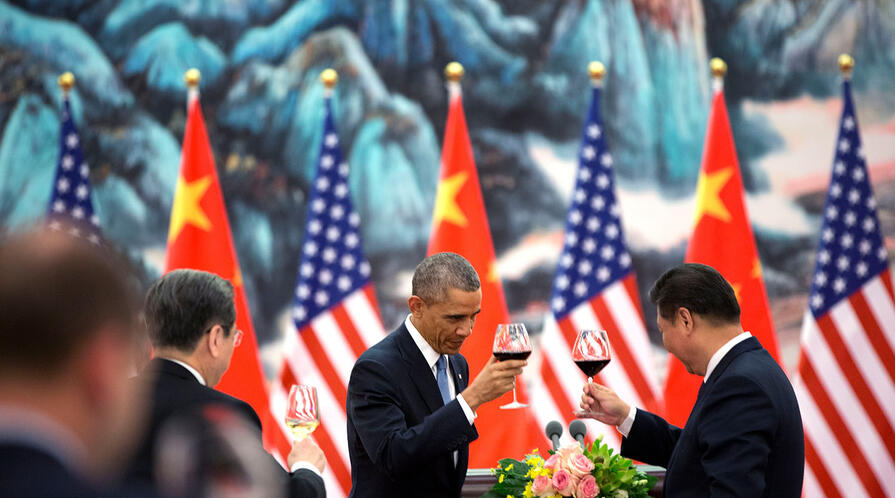Eikenberry: Toward an effective US-China policy

China’s remarkable aggregation of national power over the past 35 years has been a source of wonderment: to economists, who have been surprised by that country’s consistently high rate of growth; to political scientists, who are at a loss to explain the persistence of authoritarian Communist Party rule despite its more open market order; and to historians, who describe China’s meteoric rise as unprecedented. But to the U.S. national security community, China’s swift climb up the international power ladder has been a source less of wonderment than of increasing concern.
How should America evaluate the risks that the People’s Republic of China (PRC) poses to its current and future interests? It is a crucial question, since sound strategy depends on an accurate assessment of the capabilities and intentions of potential rivals. Significantly underestimating China’s ambitions and its future means to advance them could render the United States strategically vulnerable. Exaggerating those same factors risks an inefficient use of America’s diplomatic, military, and economic resources, while counterproductively stimulating more vigorous PRC investments in hard power than would otherwise be the case.
Much literature has appeared in recent years speculating on future Sino-American cooperation, competition, or conflict. While there is no shortage of theories of international relations to inform conjecture on likely future scenarios, two in particular highlight the sharp contrasts in approach and perspectives that characterize this debate. The first is realism, which assumes an evolving international environment in which fierce competition between leaders and challengers is the norm. The realist dynamic is sometimes called the “Thucydides Trap”, a term inspired by Thucydides’ famous account of the seemingly inevitable conflict between the rising city-state of Athens and the status quo power Sparta as they struggled for dominance of Ancient Greece in the fifth century BCE. Realists who embrace the Thucydides Trap metaphor argue that the risks of hegemonic wars between rising states (such as China) and status quo states (such as the United States) are high. A second and contrasting theory framing this discussion is neoliberalism, which assumes that open-access political systems (which China is not) and market-based economic exchange create opportunities for the realization of positive sum gains between competing powers. Deepening socio-economic interdependence, encouraged and sustained by skillfully designed international institutions, can ensure stability and growing prosperity.
These two perspectives promote very distinct U.S. approaches for dealing with the challenges posed by a rising China. Realists, who believe that states operate in an unsentimental and unforgiving environment, would advise current U.S. leaders to keep ample powder dry, to leverage existing and acquire new allies, and to occasionally accommodate when relevant U.S. interests are much less than those of China. Persuaded that the China locomotive will keep speeding down the tracks in the years ahead, a realist would point to growing U.S.-China friction in the East and South China Seas as the shape of things to come.
Neoliberals would advise the status quo power to maintain the vibrancy and appeal of liberal political-economic norms and institutions in the belief that the contender will find it more advantageous to be a member of a successful club than to start one of its own. More importantly, neoliberals argue that long-term club membership leads to co-option and to an evolutionary change in the contender’s values. Of course, the neoliberal predictions of co-option and an evolutionary change in values are sharply at odds with those of China’s Communist Party, whose leaders envision no evolution concerning its monopoly on political power.
Both Thucydidean realists and neoliberals warn against the adoption of the other’s viewpoint. Realists point out that overly-optimistic predictions of China’s power trajectory could result in a less robust U.S. foreign policy that might encourage PRC aggression, undermine America’s reputation, discourage the commitment of allies, and set conditions for the possibility of a significant strategic setback. Neoliberals counter that too muscular a policy could undercut cooperative efforts at securing optimal agreements between the United States and China that might help improve long-term relations. Moreover, while either side could be correct, both could prove irrelevant if China’s growth slows significantly, seriously weakening its prospects to become a truly formidable challenger.
No matter what the perspectives or underlying assumptions, any useful analysis of this vexing and serious policy dilemma requires a deep understanding of China’s current standing in both regional and global affairs, as well as comprehensive knowledge of the internal and external constraints it faces in trying to realize its long-term ambitions. An effective China policy for the United States is best built on a foundation that is grounded in sober, thorough assessments of the context in which Sino-American relations exist and operate. [...]
The first paragraphs of the article "China's Place in U.S. Foreign Policy" (The American Interest, vol. 10, no. 6) have been reproduced here with permission; access to the full article is available on The American Interest website.
Karl Eikenberry is a distinguished fellow at the Freeman Spogli Institute for International Studies, and director of the U.S.-Asia Security Initiative at the Walter H. Shorenstein Asia-Pacific Research Center, announced earlier this month.
